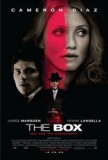| Reviews & Columns |
|
Reviews DVD TV on DVD Blu-ray 4K UHD International DVDs In Theaters Reviews by Studio Video Games Features Collector Series DVDs Easter Egg Database Interviews DVD Talk Radio Feature Articles Columns Anime Talk DVD Savant Horror DVDs The M.O.D. Squad Art House HD Talk Silent DVD
|
DVD Talk Forum |
|
|
| Resources |
|
DVD Price Search Customer Service #'s RCE Info Links |
|
Columns
|
|
|
Box (2009), The
The stranger in Kelly's film is Arlington Steward (Frank Langella), which adds another air of mystery. Steward has a burn wound on his face and perfectly mannered, precise attitude, explaining the details of the deal to Norma Lewis (Cameron Diaz) calmly and efficiently, in that radio-ready Langella voice. Steward is a vision of class and sophistication, so what reason could he have to lie?, Norma wonders aloud to her husband Arthur (James Marsden), when he returns home from work. Intrigued, Arthur opens the bottom of the box to reveal an empty interior. It's gotta be a scam. On the other hand, the crisp new $100 bill Steward has left with Norma is real, and not only is she worried about her son's tuition but Arthur's also reconsidering his position at NASA after being denied entry into the astronaut program. It never hurts to have a million dollars...
At this point, The Box soars off into even weirder directions, eventually concocting an unusual conspiracy that still ties itself in to the original moral choice presented by the box itself. Unusual is Kelly's forte; I missed Southland Tales but am a fan of his 2001 debut picture Darko, which shares several themes with The Box. The line between Kelly's creation and Matheson's story is not invisible, but Kelly has weaved the stories together well, complementing the source material with further layers of moral intrigue.
When Donnie Darko: The Director's Cut was released in 2004, lots of fans complained that the new version gave away too much. In my estimation, some of these people just wanted mystery for the sake of mystery or felt that a fully-formed explanation for Kelly's ideas precluded any personal interpretation. Personally, I don't buy it; I don't see why fully understanding Darko's concepts would ruin the movie. Kelly's director's cut is problematic not because he provides too much information, but that he bludgeons the audience with it by slapping textual information right up there on the screen, bending over backwards to connect each dot so that anyone who hit the bathroom or glanced at their cell phone is sure to understand. After an hour of gripping suspense, The Box threatens to make the same mistake, by spelling things out in a scene where Langella and an NSA official have an expositional chat in a Dr. Strangelove-inspired building. It's hard to tell where the right answer lies. The revelations in the scene definitely interrupted my enjoyment, but the alternative might be the movie not making sense. Even with the scene, several people at my screening were clearly still confused, and I can't know how I would have followed the rest of the film without this scene to hold my hand.
The third act is a little less illuminating. At one point, it feels like a chunk of the movie is missing, when James Marsden drives from point A and appears out of nowhere at point C without enough explanation of what happened in the middle, even if we know where he must have been at point B. We only get less information about Diaz, who shows up with him at point D without even telling us if anything happened in the middle when it certainly looked like something was happening at point A. There is also the brief appearance of a manual that seems like a bit of a mis-step, not recalling Darko so much as stealing from it. The film's conclusion is neither good nor bad, presenting another moral conundrum without illuminating the audience as to the "right" decision (for the record, I think the characters choose incorrectly).
Ultimately, The Box is not about the experience of watching it, but the things the viewer considers afterward. I imagine it's impossible to watch the film and not think, however briefly, about what you would do presented with the same scenario. The movie is driven primarily by James Marsden's performance as Arthur, who makes for a compelling everyman, allowing the audience to relate to his actions. He brings out the best in an uneven Cameron Diaz, who struggles a bit with the southern accent, but does better with the emotional aspects of a physical disability, sharing a compassionate moment with Langella's character. There was a "Twilight Zone" episode based on "Button, Button", and The Box feels like it was cut from the same cloth. It's far from perfect, but Kelly has created my favorite kind of science fiction: thoughtful and creepy.
Please check out my other DVDTalk DVD, Blu-ray and theatrical reviews and/or follow me on Twitter.
|
| Popular Reviews |
| Sponsored Links |
|
|
| Sponsored Links |
|
|
| Release List | Reviews | Shop | Newsletter | Forum | DVD Giveaways | Blu-Ray | Advertise |
|
Copyright 2024 DVDTalk.com All Rights Reserved. Legal Info, Privacy Policy, Terms of Use,
Manage Preferences,
Your Privacy Choices | |||||||










